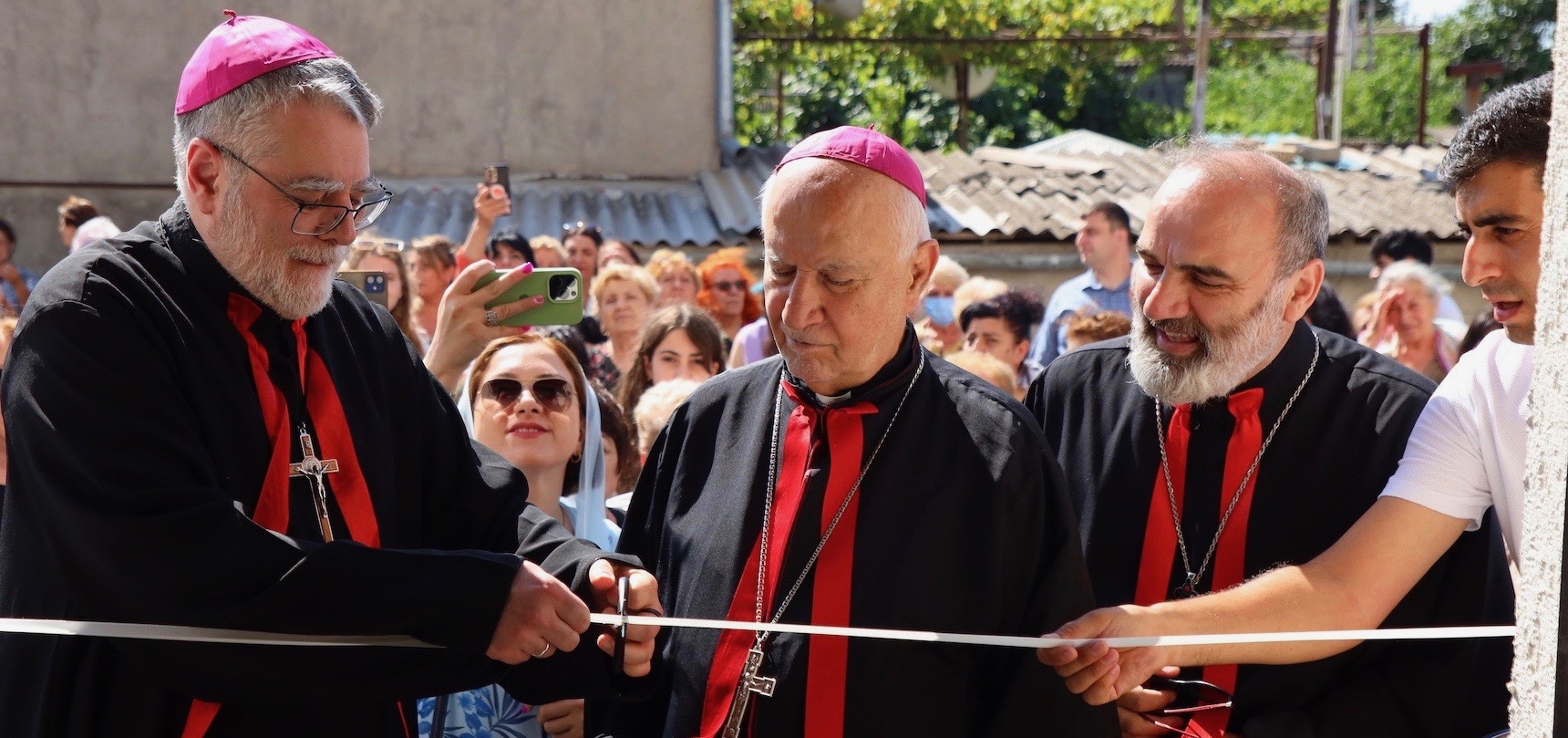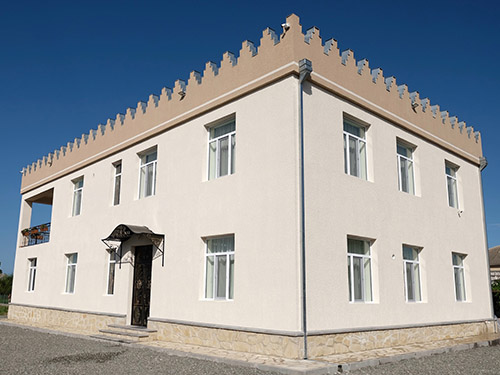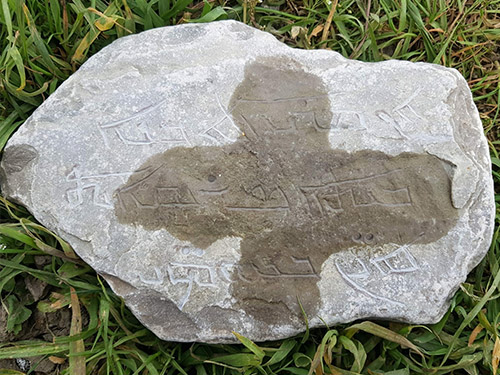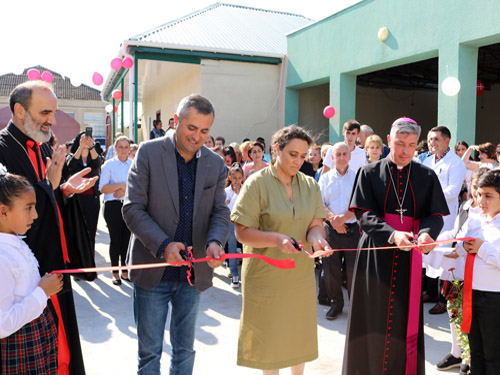MAR THOMA ASSYRIAN - CHALDEAN RELIGIOUS - CULTURAL CENTER IN GARDABANI
ASSYRIAN-CHALDEAN CATHOLIC CHURCH IN GEORGIA

MAR THOMA ASSYRIAN - CHALDEAN RELIGIOUS - CULTURAL CENTER IN GARDABANI
For Assyrians who have been living on the territory of Georgia for many centuries, the consecration of Mar Thoma the Apostle Assyrian - Chaldean Religious - Cultural Center, which took place on July 10, 2023 in Gardabani, without exaggeration belongs to the number of those events that will go down in golden letters in the history of our people. It was a very exciting, meaningful and emotional day for our community, especially for the local inhabitants. Many had tears in their eyes and this is not surprising, because not one generation of Assyrians was looking forward to this day.
AIMS AND TASKS OF CENTER
The building itself is multifunctional and consists of a chapel, classrooms, various spaces. It is planned to carry out spiritual, educational and humanitarian activities in the Center:
Spiritual activity
• holding Divine Liturgy and church traditions;
• lessons in the study of the Divine Liturgy and the Chants of the Church of the East;
• delivering the lectures on Biblical themes;
• catechism (children and youth groups).
Educational activity
• lessons of history of our nation;
• lessons of native language;
• lessons of Georgian language as the state language of Georgia;
• lessons of English language;
• lectures of invited specialists on various topics such as social, medical, judicial and psychological issues;
• thematic events for elder generation;
• series of thematic events on Christian values for children and youth;
• creation of group to help younger school children in the assimilation of the school curriculum;
• holding sports and recreation events.
Humanitarian activity
• caring out already existed projects on providing needy people, with restricted abilities, multi-children families and single mothers with groceries, clothes, school supplies and so on;
• creation of volunteer groups for humanitarian projects.
PRECONDITIONS OF CENTER CONSTRUCTION
Representatives of our nation live in Tbilisi, Gardabani, Senaki, Zugdidi and Kutaisi as well as in the village of Dzveli Kanda. According to the census of population in 2004 the total number of Assyrians and Chaldeans was approximately 2,400 people. Gardabani is an administrative center of Gardabani municipality and is located in the region of Kvemo Kartli, 33 kilometers away from the capital.
Assyrians have lived in Georgia since ancient times. In the 1830s, after the Russian-Persian War, some of the Assyrian families who fled from Persia settled in Georgia. In the late 1860s, a group of Assyrians from Urmia (Iran) settled in the Karaya Valley (now Gardabani region) in eastern Georgia and founded a village called “Vasilyevka”. Some of the Assyrians living in Georgia moved here in the 50s of the 20th century from Azerbaijan, where their ancestors arrived from Turkey at the beginning of the 20th century, namely from the village of Botani and surrounding villages around Lake Van. At the end of the 19th century, Assyrians who came from Urmia (Iran) also settled in the village of Kanda, Mtskheta region. Assyrians living in Georgia are Catholics or Orthodox.
Unfortunately, the number of the population has considerably decreased recently because of immigration caused by high level of unemployment in the country. There is also other serious problem of assimilation with local inhabitants, as a result of which the national peculiarities and cultural values are lost. This is the problem of all minority nations who don't have their own country. The situation has improved since the Assyrian-Chaldean Mission in Transcaucasia was founded and since Father Benyamin Betyadgar arrival to Georgia on the 3rd of May, 1995.
Initially, the task of the Mission was clarification and dissemination of the teaching of our Lord Jesus Christ but taking into consideration hard economic situation and difficult conditions of citizens of Georgia that time, Chorbishop Benyamin Betyadgar with the agreement of Church Council took a decision about extending aims and tasks of the Mission. Humanitarian and educational projects started to be developed as well as religious activities. Active work on three vital for development and integration of our community directions, is still being led by our Church.
The Assyrian-Chaldean Religious-Cultural center of Mar Shemmon Bar Sabbae was opened in Tbilisi in 2009. The Divine Liturgy is led according to the Chaldean Rite within the Center. There is a Sunday school and various events are held.
Unfortunately, due to the unstable economic situation and still high level of unemployment, majority of people, especially those who live in small settlements far away from the center, don't have any possibility to be involved into different projects relevantly.
Many economic problems and difficulty of arrival from Gardabani to Tbilisi for all members of the family still exists. Some people are not able to come due to financial and domestic problems (the villagers have possibility to sell the products of their labor on the market only on weekends). Many people are not able to come because of their health problems or long- distance intolerance as the Church is located 45 kilometers away from densely populated settlement. Traffic overload is also a great problem as the journey takes about two hours.
Due to all above mentioned factors, the decision about construction of the Assyrian-Chaldean Religious-Cultural Center in Gardabani was taken. The Center will play a great role in consolidation of the community, preservation of identity and introduction of people to their native culture as well as it will help our people to integrate into Georgian society.





















